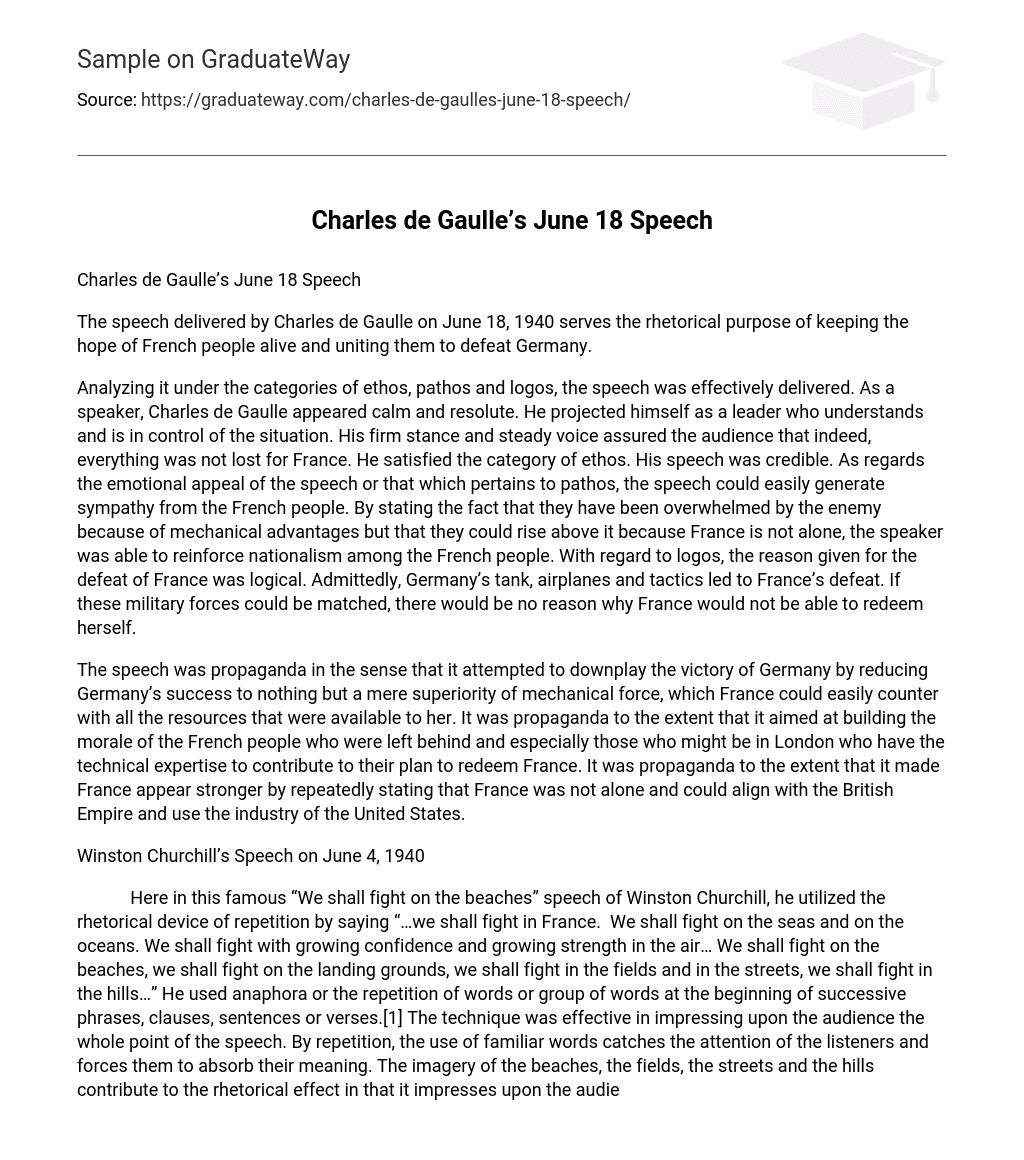The speech delivered by Charles de Gaulle on June 18, 1940 serves the rhetorical purpose of keeping the hope of French people alive and uniting them to defeat Germany.
Analyzing it under the categories of ethos, pathos and logos, the speech was effectively delivered. As a speaker, Charles de Gaulle appeared calm and resolute. He projected himself as a leader who understands and is in control of the situation. His firm stance and steady voice assured the audience that indeed, everything was not lost for France. He satisfied the category of ethos. His speech was credible. As regards the emotional appeal of the speech or that which pertains to pathos, the speech could easily generate sympathy from the French people. By stating the fact that they have been overwhelmed by the enemy because of mechanical advantages but that they could rise above it because France is not alone, the speaker was able to reinforce nationalism among the French people. With regard to logos, the reason given for the defeat of France was logical. Admittedly, Germany’s tank, airplanes and tactics led to France’s defeat. If these military forces could be matched, there would be no reason why France would not be able to redeem herself.
The speech was propaganda in the sense that it attempted to downplay the victory of Germany by reducing Germany’s success to nothing but a mere superiority of mechanical force, which France could easily counter with all the resources that were available to her. It was propaganda to the extent that it aimed at building the morale of the French people who were left behind and especially those who might be in London who have the technical expertise to contribute to their plan to redeem France. It was propaganda to the extent that it made France appear stronger by repeatedly stating that France was not alone and could align with the British Empire and use the industry of the United States.
Winston Churchill’s Speech on June 4, 1940
Here in this famous “We shall fight on the beaches” speech of Winston Churchill, he utilized the rhetorical device of repetition by saying “…we shall fight in France. We shall fight on the seas and on the oceans. We shall fight with growing confidence and growing strength in the air… We shall fight on the beaches, we shall fight on the landing grounds, we shall fight in the fields and in the streets, we shall fight in the hills…” He used anaphora or the repetition of words or group of words at the beginning of successive phrases, clauses, sentences or verses.[1] The technique was effective in impressing upon the audience the whole point of the speech. By repetition, the use of familiar words catches the attention of the listeners and forces them to absorb their meaning. The imagery of the beaches, the fields, the streets and the hills contribute to the rhetorical effect in that it impresses upon the audience that the battle will be fought relentlessly in every way possible.
Winston Churchill’s Speech on June 18, 1940
The “Finest Hour” speech was famous because of the impact it made on the audience when he said, “Let us therefore brace ourselves to our duties, and so bear ourselves that if the British Empire and its Commonwealth last for a thousand years, men will still say, ‘This was their finest hour.’ ” The dramatic effect of substituting “us” with “their” was brilliant in stirring passion in that they ought to do what they had to do and people generations after will remember them for their courage. The use of imagery in “sunlit uplands” and in “abyss of a new Dark Age made more sinister” impresses upon the audience the resulting beauty or evil if Britain would win or lose to Germany.
[1] Robert Harris. A handbook of Rhetorical Devices, December 24, 2009. [online] available from http://www.virtualsalt.com/rhetoric2.htm#Anaphora visited July 17, 2010





